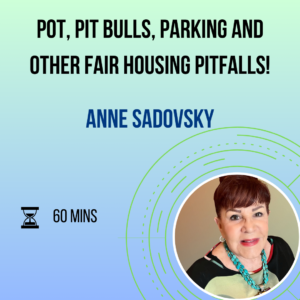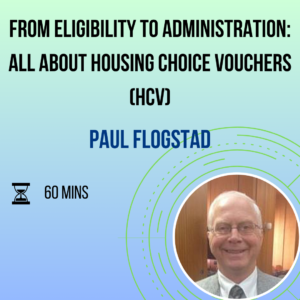Marketing and Empathy Psychology
REAC & Fair Housing Bundle Pack
Lorem ipsum dolor sit amet, consectetur adipiscing elit. Ut elit tellus, luctus nec ullamcorper mattis, pulvinar dapibus leo.

Tab #1
Tab #2
Tab #2
Tab #1
Lorem ipsum dolor sit amet, consectetur adipiscing elit. Ut elit tellus, luctus nec ullamcorper mattis, pulvinar dapibus leo.
Tab #2
Lorem ipsum dolor sit amet, consectetur adipiscing elit. Ut elit tellus, luctus nec ullamcorper mattis, pulvinar dapibus leo.
Tab #2
Lorem ipsum dolor sit amet, consectetur adipiscing elit. Ut elit tellus, luctus nec ullamcorper mattis, pulvinar dapibus leo.
Webinar 1
Webinar 2
Webinar 3
Webinar 1
REAC and the new NSPIRE Model
- DURATION : 60
- DATE / TIME(EST) : January 22, 2025 | 1:00 pm
- SPEAKER : Paul Flogstad
HUD has developed an INSPIRE model to update the physical inspection process. These new regulations go into effect in October of 2023.
This model of the inspection was introduced by the HUD in response to concerns about the effectiveness of the REAC Inspections.
The goal of the NSPIRE is to modernize and improve the inspection process of HUD-assisted properties with a stronger emphasis on health, safety, and functional aspects.
It is designed to be more resident-focused. It promotes transparency and collaboration among property owners, managers, and residents
Will Cover in the Webinar:
- Purpose of REAC and INSPIRE
- New inspection process
- New scoring system
- New inspection frequency
Who should attend:
- Property Managers
- Property owners
- Leasing agents
- Builders
- Developers
- Realtors
- Housing Authorities
Objective & Benefits
The new NSPIRE model will make it easier for owners and managers. They have combined the inspectable areas down from five to just three. It also focuses on self inspections. The goal is to initiate a continuous maintenance plan at the property
This model of the inspection was introduced by the HUD in response to concerns about the effectiveness of the REAC Inspections.
The goal of the NSPIRE is to modernize and improve the inspection process of HUD-assisted properties with a stronger emphasis on health, safety, and functional aspects.
It is designed to be more resident-focused. It promotes transparency and collaboration among property owners, managers, and residents
Webinar 2
What You Need to Know NOW About Fair Housing
- DURATION : 75
- DATE / TIME(EST) : January 22, 2025 | 1:00 pm
- SPEAKER : Anne Sadovsky
HUD made some big changes regarding Emotional Support animals. You may be in for a surprise!
We have had more fair housing changes in the past few years than we had in 20 previous years. It makes it hard to keep up and to be sure that we are in compliance. Plus, some of the changes are worded in ways that make it difficult to be understood. States and cities are adding changes as well, insurance companies question and challenge the rules.
Frequent education for the entire staff is critical to prevent complaints and lawsuits. Be sure to include the maintenance team.
Fair Housing training doesn’t have to dull and boring; with stories and cases it can be somewhat entertaining. Anne shares real cases and experiences that are ‘wake up calls’ for your company, properties and team members.
You will also get guidance for handling fake/internet created Service Animal documents housing providers are more often being accused of sexual harassment phony testers are calling properties and provoking our team members to answer questions inappropriately. Violence against women is increasing. What is your responsibility?
With the most current changes, many of which seem unclear, staff members could make very costly mistakes. Anne will review HUD language and make clear what our responsibilities are today as compared to just last year.
What You Will Learn
- Are You confused about: *Smoking ; cigarettes, pipes, marijuana – neighbor complaints, allergies, what can we do?
- *ESAs and Service Animals…how many? What kind? – Neighbor complaints, allergies, what can we ask?
- *Can a parrot, a lizard be an EDA? – Then what about a duck? Or a pig?
- Is there housing for people who want to live away from children? – (55 and older/62 and older) Can the grandkids visit?
- *Violence Against Women/Sexual Harassment? What mistakes are being made and the consequences?
- Does Gender protect the LBGTQ community? What else has changed in Fair Housing domestic animals can now be considered ESAs?
- How to handle appropriately handle the internet service animal documents since HUD sees our side.
- Develop a ‘script’ to use when a caller pushes for information regarding leasing to felons, What animals can be service/support and more.
- What can you do to help residents who are being harassed/intimidated/stalked by a former spouse/boyfriend/girlfriend?
- Can my Staff members be accused of sexual harassment?
- Is two persons per bedroom still the basic occupancy standard?
- Who is responsible for translating when an applicant/resident does not speak English?
- Does my state approve of marijuana usage? What do the Feds say??
What Attendees Can Expect to Learn Post Attending this Webinar
They will have clarity on the latest rulings/changes/documents and how they impact their daily operations. They will also be prompted to make changes in the wording of their current policies. The staff will be clear on how to answer questions to prevent entrapment.
You may think you know everything about fair housing; from this webinar, you will be updated and clear on the latest changes and how they affect your policies and procedures.
Who Should Attend
Every staff and service team member should attend and be updated on the latest changes/additions. Plus Supervisor and Regional managers/small owners
Webinar 3
Affirmative Fair Housing Marketing Plans
- DURATION : 60
- DATE / TIME(EST) : January 22, 2025 | 1:00 pm
- SPEAKER : Paul Flogstad
Many federal or state funded, insured or assisted housing programs have an obligation to create and implement an Affirmatively Fair Housing Marketing (AFHM) Plan. The AFMH Plan is a marketing strategy designed to attract buyers and renters of all majority and minority groups, regardless of sex, handicap, familial status, etc. to assisted and insured rental projects and sales dwellings which are being marketed.
The Plan describes initial advertising, outreach (community contacts) and other marketing activities which inform potential buyers and renters of the existence of the units. No applications for applicable HUD-assisted programs may be funded without an approved AFMH Plan.
Who should create an Affirmative Fair Housing Marketing Plan? – Federal Housing Programs All applicants for subsidized and unsubsidized multifamily projects, mobile home parks and single-family subdivisions of five or more units, spaces or lots which are funded or insured under certain HUD programs are subject to program requirements which carry an obligation to create an AFHM Plan. Applicants may include Public Housing Authorities, non-profit developers or housing providers, and other HUD program participants.
Webinar Agenda:
- Creating an Affirmative Fair Housing Market Plan
- Targeting
- Outreach
- Indicators
- Staff Training
- How long does the AFMH Plan last and how often does it need to be updated?
- Common AFHM Plan Mistakes
- And much more.
Who will Benefit:
- Property Managers
- Property owners
- Maintenance Staff
- Realtors
- Compliance Staff
- Legislators
Webinar Information
- DURATION : 75
- DATE / TIME(EST) : APRIL 10, 2024 | 1:00 PM
- SPEAKER :
Share this event
Related products
-

Pot, Pit Bulls, Parking and Other Fair Housing Pitfalls!
$199.00 – $349.00 Select options This product has multiple variants. The options may be chosen on the product page -

How to Deal with Resident Infractions: Hoarding, Harassment, Unauthorized Occupants and Pets, Noise, Parking, etc.
$199.00 – $349.00 Select options This product has multiple variants. The options may be chosen on the product page -

From Eligibility to Administration: All About Housing Choice Vouchers (HCV)
$199.00 – $349.00 Select options This product has multiple variants. The options may be chosen on the product page -

Affirmative Fair Housing Marketing Plans
$199.00 – $349.00 Select options This product has multiple variants. The options may be chosen on the product page



